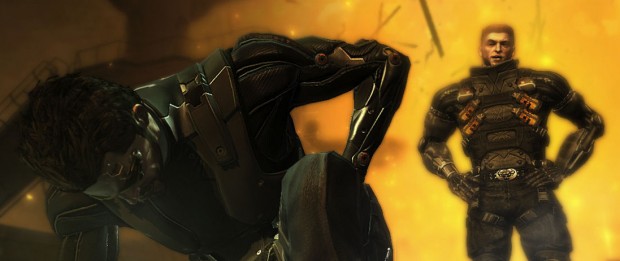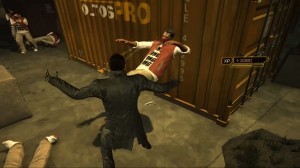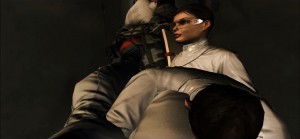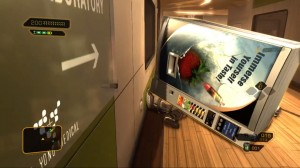Adam Jensen: Death Vendor
- By Grant Howitt
- Updated: 21st Jan, 2013

I started playing Deus Ex: Human Revolution again, recently, one night when my wife was out and I had nothing better to do. Having completed the game once – and then got halfway through doing the opposite of everything I did before, much like pretty everyone else did, I imagine – there wasn’t a lot that it could show me, I felt.
I figured I’d try a themed playthrough. I’ve been doing them for years. This one time, I played through the entirety of Max Payne using only melee weapons, except when enemies were deliberately placed out of my reach. When I played Fallout: New Vegas, I refused to upgrade any skills other than Unarmed or Speech, and ended up talking my way in and punching my way out of every single situation.
 My special move was the Torsopunch, where you punch someone’s torso so hard it flies backwards and leaves their limbs and head in place. No-one ever sees the Torsopunch comin’, let me tell you.
My special move was the Torsopunch, where you punch someone’s torso so hard it flies backwards and leaves their limbs and head in place. No-one ever sees the Torsopunch comin’, let me tell you.
I Am Legend Mode
I was meandering through the streets of Neo-Detroit on Deus Ex and doing my best to ignore the blaxploitation vagrants when I overheard almost everyone saying how scared they were of Augs – Augmented Humans, in other words, people with machines jammed into their skin to make them more efficient. There were rumours flying all over the place about Augs flipping out and killing people, or stalking the streets, or generally being unhinged maniacs because having fully-automatic sunglasses built into your face can apparently mess with your head a bit.
So I thought – all right. Let’s do it. Let’s be the Aug from these people’s nightmares. Let’s mess things up. There was a fantastic moment when a woman in the street told me that I was dangerous scum and should be locked away or killed and instead of just taking it on the chin and soldiering on as I normally did, I grabbed the top of her head and span my robowrist like a roulette wheel, shattering her neck in the process.
People ran away screaming, of course. It was a bad thing to do. But for a second, after a long playthrough of using only non-lethal methods except in extreme circumstances, I felt a surge of power run through me. This is agency. This must be how Bond villains feel after executing a henchman.
I had to play the game through as Mr Nice Guy the first time round – although Tasering someone and stuffing them in a bin is a pretty strange definition of the word “nice,” come to think of it – for this to have weight. I’d established the imaginary humans as worthy of respect in the first playthrough, so when I decided I wanted to embark on a career as a terrifying murderbot, it felt so much more potent. Without that first arduous semi-pacifist slog, the people would just be collections of pixels.
Creative Murder Solutions
I reloaded my save and hit my first proper mission, the one where you go to investigate some hacker and then he shoots himself and there’s a guy with an eyepatch and revolver at the end; there’s plot, somewhere, but plot was never my strong point. Anyway. I start murdering people.
It’s probably better that my wife was out, really, because this isn’t the sort of gameplay you want to watch someone perform. I’d sneak into places and messily dispatch guards with my big extendo-armblades – and boy, did it feel good to use them after 17 hours of just punching people in the face – but leave one alive. Maybe knock him out. Maybe shove them in an air vent with five dead bodies, so they’ll come round under the weight of dead flesh and need therapy for years to come.
 It wasn’t especially pleasant.
It wasn’t especially pleasant.
But it was powerful. Here was a world I’d tended to and respected, laid out before me. In Deus Ex you play a superhuman, and the plot is superheroic by default; but Adam Jensen, now, was a Supervillain. And not the big kind that build massive freeze rays and inexplicably try to destroy an entire city with them, the small-scale kind. Like a super-powered Jack the Ripper.
This was abuse of power in the strictest sense of the word, an abuse of the trust that the game places in you by giving you a) lots of squishy humans and b) the ability to kill people by lunging through walls and breaking their goddamn necks in an awe-inspiring display of brutality. I’m not going to lie – it felt good to explore that, to take on a different character, to read the game differently in respect to my actions. It felt good to play the bad guy in a world I’d created partially in my imagination.
I brought the Strength Upgrade as soon as possible as I wanted to be able to heft bodies out of the way of patrols, or more commonly, into the faces of patrols from a nearby balcony at terminal velocity before I jumped down and sub-machine gunned everyone into a sort of chunky paste. It was only then, after hours of setting up increasingly elaborate and gruesome deaths, that I discovered weaponised vending machines.
My vending machine-fu is strong.
No Change or Quarter Given
Vending machines are an incredible weapon in DE:HR – they’re noisy, they’re unwieldy, and they very much depend on a third party deciding in advance that your targets will need to be supplied with ice-cold beverages at the push of a button. But they are, crucially, a Goddamn vending machine that you throw down corridors at people. That’s going to ruin anyone’s day, at the very least.
 Just when the thrill of being an unhinged corporate assassin more in line with Syndicate than DE had started to wear off, the vending machines ramped it up a notch. This was the ultimate insult. Adam Jensen doesn’t kill you with weapons. Adam Jensen hides behind vending machines and when you come up to inspect it he throws it at you so hard you die.
Just when the thrill of being an unhinged corporate assassin more in line with Syndicate than DE had started to wear off, the vending machines ramped it up a notch. This was the ultimate insult. Adam Jensen doesn’t kill you with weapons. Adam Jensen hides behind vending machines and when you come up to inspect it he throws it at you so hard you die.
The power went to my head. If there was a vending machine nearby – and “nearby” is a pretty fluid term, here, I’d lug vending machines halfway across levels, chowing down on energy bars to keep my augs charged up enough to allow it – I’d refuse to kill with anything else. In fact, killing someone in any other way felt hollow. Useless. I’d been shown the majesty of the vending machine, the perfect blend of challenging set-up and incongruous hilarity and bone-crunching damage, and everything else seemed flat.
This Must Be How Dr Manhattan Felt
I stopped playing one or two sessions after, and haven’t been back. When I treated DE:HR as a real place that I had to protect and shepherd, it felt satisfying to move around in. When I killed someone – and I did kill people – it meant something. Sometimes it meant I was out of Taser batteries. But more often than not it was because I’d decided this person had to die and I was the man who was going to do it.
When I was a villain, though, a murderer, I stopped respecting the rules of the world. Killing in all but the most challenging and ridiculous ways didn’t excite me any longer. Combat lost its sheen. I had no taboo to break, no excitement in tiptoeing around the moral grey area in which I operated. I got jaded and bored, and I started to break my own rules, even. Everything became a route to the next vending machine. Or fridge. In a pinch, a fridge would do.
Discovering the fact that you can kill people with vending machines is the end of Deus Ex: Human Revolution. It’s not the final chapter with the research rig and the Gigeresque women and the room with Four Buttons That Play The Ending Movies. After you’ve played that chapter, you’re immediately drawn back into the game to try other things. To see what you could have won.
Once you throw a vending machine at three men and kill all of them in one go, you realise that you have just too much power for this world, and there’s no point in exploring it any more. Whatever I do it’ll either be a) throwing vending machines at people or b) not as much fun as throwing vending machines at people. Maybe I just like throwing vending machines too much. But I think it says something that the greatest discovery in my game also marked the point where I stopped caring about it.
[Screenshots: Death by Vending Machine, Punch Punch Revolution 3, Hiding Dead Bodies in Air Vent]
One Comment
About Grant Howitt
Grant Howitt is a freelance games journalist who regularly writes for publications like The Guardian, PSM3, and FHM. He's been gaming since his mum got him a second-hand Mega Drive when he was seven, and he hasn't looked back since. Favourite games include Max Payne 2, Ocarina of Time, GTA San Andreas and Shadow of the Colossus - anything third-person with plenty of style. When not playing video games he's playing tabletop RPGs (or writing them himself) and running Zombie LARP, which is a LARP, with Zombies in. Grant is incredibly available for commissions at this time and will generally work for a cup of tea and the bus fare home.

Pingback: Deus Ex: The Fall Review (iOS) - The Average Gamer